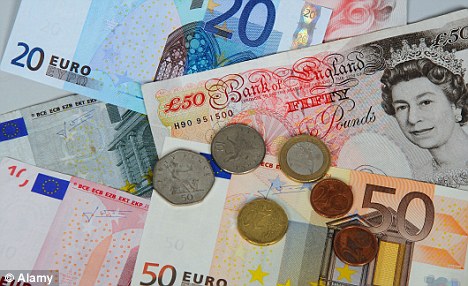There is a vicious rumor that is pervasive throughout the customer service industry… foreigners are cheap tippers. It’s often true, but not for the reason American servers think. The real problem is that American bartenders and servers often give bad service to Europeans because they expect a bad gratuity. Then, when they get a 10% (or less) gratuity, they tell anyone who will listen how bad foreigners tip and the rumor continues to perpetuate. Of course, there are always foreigners who are intentionally cheap, but not anymore or less than citizens of this country. American service staffs have a major disadvantage to our counter parts in the rest of the world. We feel entitled to our gratuities.
In Europe, gratuity is included in the price of the meal and leaving a little loose change (approximately 10%) is truly optional, it’s never expected and genuinely appreciated. In the United States servers are largely dependent on gratuities to make a living wage (some states legally pay their employees a meager 50% of the national minimum wage). So when a guest leaves a low gratuity, it is understandably frustrating, especially if the server thought their service was good.
I’ve often heard bartenders say “Foreigners know better, they are just playing ignorant.” Or “They should have studied the local customs.” That maybe so, but that is never, ever, an excuse for giving poor service. The truth is that many foreigners are simply ignorant of the proper tipping practices in this country. Remember, in Europe the tipping rules are generally the same no matter where you go. In the U.S., we have fifty states with fifty different tipping practices. Depending on the individual state wages and taxes deciphering an American check can be confusing and figuring out the local tipping rules is anybody’s guess (10%, 15%, 20% or more?). In any case, even if your guest knows the customs and leaves a poor tip they may actually have a reason.
I recently had a friend who was visiting from the U.K. He was out with some very high profile clients who he was trying to impress. He took his guests to a famous swanky restaurant (who shall remain nameless) and deliberately spent an obscene amount of money on drinks and dinner. Sadly, he felt the service was lackluster. From the moment he opened his mouth and identified himself as the host (and foreigner) the server treated him with disdain to the point where his clients made a comment. Even if this was only his perception, perception is everything in the customer service industry. He didn’t expect superior service; however he was expecting adequate service.
When it came time to pay the check, my friend discretely left a 10% gratuity. Not because he was upset or trying to make a point, he just left what he thought was an appropriate tip for mediocre service with an attitude. In Europe, he would have left no tip at all, but was familiar that 10%-15% is generally regarded as a minimum gratuity in the USA (depending on where you are). To make matters worse my friend was genuinely unsure if he was supposed to tip on the wine. He opted not to tip on some very expensive wines because there wasn’t any proper wine service. There was no sommelier to decant, properly handle or pour the delicate wines; instead the server opened the bottles, poured the first round, then left the bottle and cork in the middle of the table.
More to the point, she did not offer to taste the host and did not pour the ladies first. As a professional barman for close to thirty years, on this point, I believe my friend was absolutely correct in not tipping on the wine. Unfortunately, with the expensive wine, that reduced the total check gratuity to less than 5%. Almost every bartender or server reading this right now can sympathize and in many cases empathize.
But here is where the story goes horribly wrong: After paying the check, my friend took his clients to a different establishment for a nightcap. By coincidence the server from the previous restaurant walked in having just gotten off work and looking for a drink. She recognized the group, approached them and berated them all for leaving such a paltry gratuity. My friend was understandably shocked and mortified. Interestingly enough, I know people in the industry who would argue that the server was off duty and therefore had every right to complain.
I believe that if she is on the payroll, she is a representative for that restaurant and therefore her actions were wholly inappropriate and reflect badly upon management and ownership. More importantly she publicly humiliated a guest for leaving a poor tip when that is exactly what he intended and what she deserved. The next day he called and complained. Management was appropriately contrite, they investigated and the server was reportedly terminated (unconfirmed). Do I feel bad for the server… yes. Did she deserve to get fired… absolutely!
When I hire new staff for my clients one question that I always ask is “What would you do if you received a 0% gratuity on a check?” The most common answer is “I would do nothing…” To me that is a minimally acceptable answer. The better answer is “I would immediately make a manager aware of the situation before the guest left”; to which I always ask “Why?” If they say they want to get a manager involved to salvage their tip… they’re done.
However, a manager should be made aware if there is little or no gratuity; for two reasons. First in case the guest complains, management is prepared to address any specific incidents or voiced concerns. The second reason is so management can be sure to approach the table to casually (and politely) ask how everything was that evening in case they don’t complain. If the guest is unhappy, they will usually let you know. If they seem happy and have no specific complaint thank them so much for coming in and tell them you look forward to their next visit… and that’s all.
Of course, there is no scenario where anybody asks about the gratuity or lack thereof. It’s not just grossly inappropriate, it’s just poor form. The funny thing is, if you ask most bartenders if they would rather have gratuities or a higher hourly wage, the vast majority would prefer gratuities. That’s because most bartenders and servers recognize one undeniable truth… What goes around comes around.

